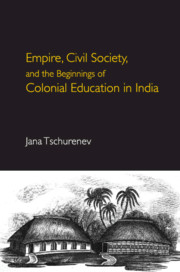Book contents
- Frontmatter
- Dedication
- Contents
- List of Figures
- List of Tables
- List of Abbreviations
- Acknowledgements
- Introduction: Empire Civil Society, and Educational Transformation in India
- 1 A Colonial Experiment in Education, Madras, 1789–1796
- 2 Education of the Poor, 1805–1813
- 3 Missionaries, Empire, and the Cause of Universal Education, 1792–1824
- 4 Race, Class, and Gender: The Social Agenda of Education, 1809–1830
- 5 Rules and Numbers: Transforming Rural Education, 1814–1830
- 6 Intellectual Conquest: Education Societies, ‘Useful Knowledge’, and the Bengal Renaissance, 1817–1854
- 7 Civil Society, Government, and Educational Institution-Building, Bombay Presidency, 1819–1882
- 8 Teaching the Marginalized: Universal Education and the Politics of Inequality, 1789–1937
- Conclusion: The Emergence of Public Elementary Schooling in an Imperial Frame
- Bibliography
- Index
4 - Race, Class, and Gender: The Social Agenda of Education, 1809–1830
Published online by Cambridge University Press: 26 April 2019
- Frontmatter
- Dedication
- Contents
- List of Figures
- List of Tables
- List of Abbreviations
- Acknowledgements
- Introduction: Empire Civil Society, and Educational Transformation in India
- 1 A Colonial Experiment in Education, Madras, 1789–1796
- 2 Education of the Poor, 1805–1813
- 3 Missionaries, Empire, and the Cause of Universal Education, 1792–1824
- 4 Race, Class, and Gender: The Social Agenda of Education, 1809–1830
- 5 Rules and Numbers: Transforming Rural Education, 1814–1830
- 6 Intellectual Conquest: Education Societies, ‘Useful Knowledge’, and the Bengal Renaissance, 1817–1854
- 7 Civil Society, Government, and Educational Institution-Building, Bombay Presidency, 1819–1882
- 8 Teaching the Marginalized: Universal Education and the Politics of Inequality, 1789–1937
- Conclusion: The Emergence of Public Elementary Schooling in an Imperial Frame
- Bibliography
- Index
Summary
It is remarkable how the same simple system of education originally taken from the native schools on these shores is now returned with increased effect and with higher and more extensive designs.
Educational Differentiation and Social Inequality
It is now time to return to India and thus to the ‘shores’ from the schools of which the inspiration for the monitorial system of education had been ‘originally taken’. This chapter discusses the educational programmes that missionaries and education societies developed in Bengal and Bombay in consideration of the local context. It particularly explores the social agenda of schooling, or, in the words of the Bombay Education Society's (BES) report of 1821, the ‘higher and more extensive designs’, that the new actors pursued with the re-export of the monitorial system to India.
The previous chapter has emphasized the universalistic orientation of the British and Foreign School Society (BFSS) and its missionary partners. Now, I will analyse the place of education in colonial processes of social differentiation. Education became, as I have argued, understood as a multivalent tool of social reconstruction in England; as such, it was also employed for a project to ‘consolidate and codify new, local social structures’ in the colonies. This also relates to the question of unequal social power relations. For missionary educators, mass elementary education aimed to undermine the prevalent structures of caste- and gender-based domination – the ‘tyranny of Brahmins’ and the ‘domestic slavery’ of women. Alternative forms of patriarchy, class, and colonial divisions, however, were to take their place.
I am building on an argument made by Frederick Cooper and Ann Laura Stoler which points to the bounded universality of civilizing missions. In their efforts ‘to make colonized populations into disciplined agriculturalists or workers and obedient subjects of a bureaucratic state, colonial states opened up a discourse on the question of just how much “civilizing” would promote their projects and what sorts of political consequences “too much civilizing” would have in store’ (emphasis in original). Catherine Hall has equally emphasized that the elaboration of difference, in terms of both gender and race, was at the heart of imperial culture. There is a striking similarity to the tension of control and expansion that characterized the nineteenth-century debates on mass education. How much education was necessary to moralize and discipline subaltern children?
- Type
- Chapter
- Information
- Publisher: Cambridge University PressPrint publication year: 2019



